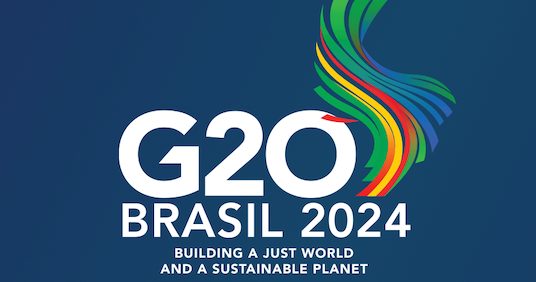
G20: Rich nations begin early donation to IDA fund replenishment
- Tinubu positions Nigeria on the beggar side
Sopuruchi Onwuka
The world’s leading nations weekend began early pledges towards contribution of over $125 billion dollars that would form the pool of funds from where the World Bank and its development finding units will begin disbursement of loans and grants to poor nation, especially in Africa.
The donations most of which were announced at the G20 summit in Brazil last week coincided with the request by President Bola Tinubu for the National Assembly to approve a fresh N1.767 trillion, or $2.209 billion in new external borrowing plan in the 2024 appropriation act.
The borrowing plan by the president contradicts his earlier posture of liquidating the debt burden he inherited from former President Muhammadu Buhari which, according to him, imposed debt services obligations that took about 95 percent of government’s foreign exchange earnings.
The World Bank’s IDA fund, which provides mainly grants and very low interest loans to the poorest countries, is replenished every three years, and a pledging conference is scheduled in Seoul, South Korea this for December.
President of the World Bank, Ajay Banga, stated that the scheduled pledging conference is expected to generate huge pool of new funds that would exceed the $93 billion refunding in December 2021.
Donor countries are looking at the rising demands from poor nations especially in Africa which struggle with crushing debts, climate disasters, conflict and other pressures.
Nigeria is literally living on debts; and the debt service obligations have worsened the nation’s foreign exchange squeeze and forced government devalue the local currency to enable all tiers of government respond to cash call for implementation of fiscal plans.
At the G20 summit which President Tinubu attended, the United States led new pledges with significant $4 billion.
In announcing the donation ahead of his retirement from the White House and handover to a new Trump-led administration of the world’s richest and most powerful country, President Joe Biden pledged U.S. contribution to the International Development Association fund.
Biden announced the three-year pledge during a closed session of the Group of 20 summit in Rio de Janeiro, as the U.S. Treasury was leading negotiations at the World Bank for the IDA replenishment.
The new U.S. pledge is a record and substantially exceeds the $3.5 billion Washington committed in the previous IDA fund replenishment round in December 2021.
An appropriation by the U.S. Congress to fund the commitment would not likely take place until after Trump takes office in January, stoking fears over the commitment of the new government to honor the pledge.
It is unclear if U.S. President-elect Donald Trump, who has proposed cutting foreign aid in the past, will honor Biden’s pledge as he and billionaire Tesla and SpaceX CEO Elon Musk seek to slash U.S. spending through a new government efficiency panel.
Other rich and industrialized nations of the world which have played host to massive migrant surge from Africa are also contributing to the IDA fund with aim to assist African government’s rebuild their economies and address extreme poverty.
At the IMF-World Bank annual meetings in October, Spain announced plans to boost its contribution by 37% to 400 million euros or some $423 million.
Denmark had earlier in September announced a 40% increase in its contribution to about $492 million.
South Korean President, Yoon Suk Yeol, also pledged a 45% increase in the country’s contribution to the IDA fund to more than $600 million, according to the finance ministry.
The country, once a beneficiary during the 1960-1970s, will contribute this year around 845.6 billion won or $608.26 million to the fund for financial aid to low-income countries, up from 584.8 billion won in the previous fund replenishment round in 2021.
“It is for South Korea to play a leading role as a global pivot state and to induce active contributions from other countries,” the ministry said in a statement.
Banga had told reporters in October that a $120 billion replenishment is possible, but that goal would require some substantial increases in country commitments.
The Oracle Today reports that numerous countries have made early pledges for the replenishment of the IDA fund which is the World Bank’s fund focused on assisting the world’s poorest countries. This commitment includes contributions from member nations and plans for leveraging market borrowing to reach the target.
The funding aims to address key global challenges such as poverty alleviation, climate change resilience, and access to basic infrastructure in developing nations.
World Bank President Ajay Banga argues that expanding IDA represents a unique opportunity for donors to re-establish trust with developing countries, particularly in Africa, and restore those countries’ commitment to the multilateral system.
Analysts posit that in the context of low and declining trust between developed and developing countries, it is in donor countries’ strategic interest to make substantial new IDA contributions. Increasingly strained relationships with African states together with a brewing debt crisis are eroding faith in the multilateral system, endangering supply chains of critical raw materials, and opening the door for strategic rivals like Russia and China, while also diminishing the financial and geopolitical firepower of donor countries.
They argue that the 2024 IDA replenishment represents a highly efficient way for donor countries to demonstrate that they are listening to African leaders and to boost fiscal space for sustainable development.
“It could also be the first step of a broader “offer” on debt as part of wider financial architecture reform, greatly expanding access to concessional and grant financing for the poorest countries” the World Bank stated.


